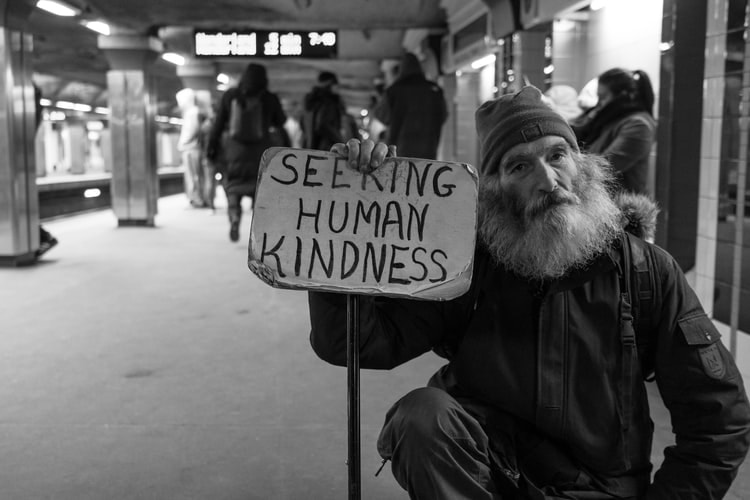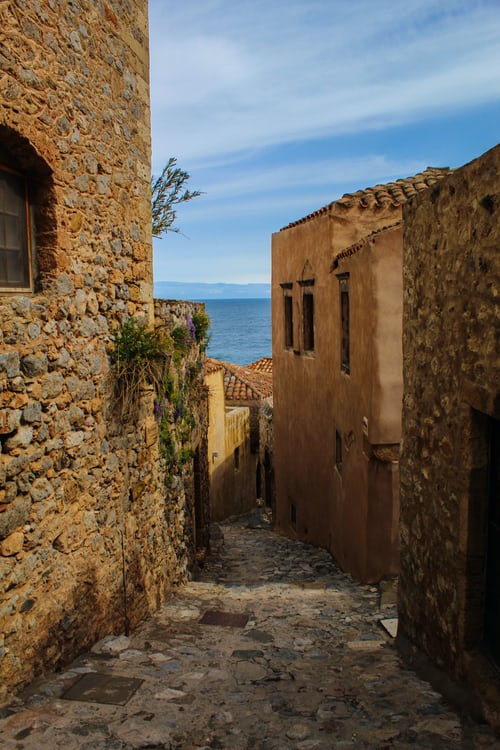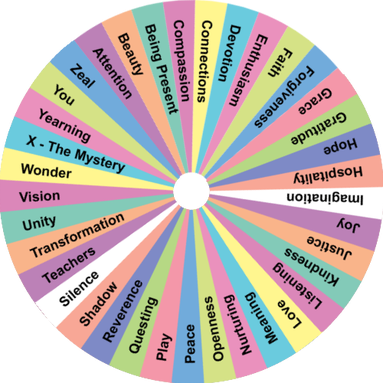From Worldview to Virtues
The Maturing of a Process Theologian
You ask a friend how she has matured or grown as a process theologian. Her answer is simple and straightforward.
I softened. I became less evangelical about process theology, and more humble and open. At least that's what friends tell me. Process theology became for me a way of living and not simply a system I tried to foist upon others. I grew interested in process theopractice or, if you will, process theopoetics. I am still interested in the worldview, but not in the same way as I was in the past. Formerly, I think I thought it was "the answer" to all important questions. Not anymore. I hope I became a better listener.
I think a transformation of this kind unfolds in many of us who are influenced by process theology and perhaps also in those influenced by other open and relational theologies, open theism, for example. We begin with exaggerated hopes for, and claims about, the process worldview. We try to convince and convert others. Over time we grow more interested in process virtues and process spirituality -- process practices -- than the process worldview.
Typically this transformation happens as we meet very good people who, for one reason or another, are not persuaded by, or who are bored by, the worldview we find so compelling. They become our teachers. And it happens when we realize that the flourishing of life, in local and global settings, matters more than the adoption of a worldview we find persuasive. The flourishing of life becomes more important to us than a shared philosophy. Here's how it works:
Stage One: We begin by being fascinated with a new way of looking at the world and God. It seems so promising, as if all questions are answered as soon as we understand how all things are interconnected and God is not a bully in the sky. We might even entertain the hope that, if people would only think as we think, the world would be a much better place. We fall into the fallacy of misplaced concreteness, confusing goodness in life and hope for the world with conformity to our worldview. If we are a bit too zealous, we want to render the world unto our own image, all in the name of a "worldview" that can "save the planet." What we once saw as a worldview that is remarkably helpful becomes, for us, a false god. We fall into a kind of fundamentalism and idolatry: process fundamentalism or Whiteheadolatry.
Stage Two: We realize that what is most important is not the worldview but the virtues, and that these virtues can be, and have been, cultivated by people in many ways - with help from the great wisdom traditions and with the arts. Judaism and Islam, Confucianism and Daoism, Buddhism and Platonism can be channels of wisdom, no less than the philosophy of Whitehead. Things change. We ourselves are creatively transformed. We become more interested in open hearts and minds, and in the well-being of local communities and life on earth, than in perfect systems. We come to see process theology as one (but only one way) of encouraging largeness of soul and a flourishing of life.
The Softening
Make no mistake. We are still intrigued by the worldview. We love its twenty key ideas; and some of us may also love the philosophy of Whitehead with all its depth and detail. We may even find ourselves evangelizing for it, albeit in gentle ways. But we know that the virtues matter more than the worldview. We soften.
One sign of this transformation is that we stop thinking axiomatically: as if the healthy and life-nourishing virtues are "derived from" or "follow from" worldviews, along the lines of conclusions drawn from axioms. We know that people live is influenced by their worldviews positively or negatively. But we recognize that how people live is by no means reducible to their worldview; and that other factors -- social, psychological, cultural, familial, and personal -- are much more influential. People do not derive their ways of living from their worldviews. They grow into their ways of living from multiple factors, and so do we.
Generous Empiricism
Abandoning the axiomatic approach, we begin to think more empirically. We meet people and we give gentle attention to how they live, how they treat others, to what is important to them. We recognize that the truths of their hearts are by no means reducible to the ideas in their heads. We enter into the listening side of love. And we simultaneously recognize that we ourselves sometimes fall short of the very virtues we espouse, while others, who may disagree with us or be bored, embody them much more fully than we ourselves. We come to admire them, to be glad that they exist and that they disagree with us. We find beauty in the disagreements.
And what are these virtues? They are of various kinds: (1) social virtues aimed at helping heal a broken world of ifs many injustices and tragedies, (2) inter-personal virtues relevant to healthy relations with family, friends and neighbors, and (3) whole-person virtues relevant to a personal spiritual journey. All are important.
I offer a list below, to which I'm sure more than be added. My suggestion is that it is these kinds of virtues that are part of what we might call a process way of living.
I softened. I became less evangelical about process theology, and more humble and open. At least that's what friends tell me. Process theology became for me a way of living and not simply a system I tried to foist upon others. I grew interested in process theopractice or, if you will, process theopoetics. I am still interested in the worldview, but not in the same way as I was in the past. Formerly, I think I thought it was "the answer" to all important questions. Not anymore. I hope I became a better listener.
I think a transformation of this kind unfolds in many of us who are influenced by process theology and perhaps also in those influenced by other open and relational theologies, open theism, for example. We begin with exaggerated hopes for, and claims about, the process worldview. We try to convince and convert others. Over time we grow more interested in process virtues and process spirituality -- process practices -- than the process worldview.
Typically this transformation happens as we meet very good people who, for one reason or another, are not persuaded by, or who are bored by, the worldview we find so compelling. They become our teachers. And it happens when we realize that the flourishing of life, in local and global settings, matters more than the adoption of a worldview we find persuasive. The flourishing of life becomes more important to us than a shared philosophy. Here's how it works:
Stage One: We begin by being fascinated with a new way of looking at the world and God. It seems so promising, as if all questions are answered as soon as we understand how all things are interconnected and God is not a bully in the sky. We might even entertain the hope that, if people would only think as we think, the world would be a much better place. We fall into the fallacy of misplaced concreteness, confusing goodness in life and hope for the world with conformity to our worldview. If we are a bit too zealous, we want to render the world unto our own image, all in the name of a "worldview" that can "save the planet." What we once saw as a worldview that is remarkably helpful becomes, for us, a false god. We fall into a kind of fundamentalism and idolatry: process fundamentalism or Whiteheadolatry.
Stage Two: We realize that what is most important is not the worldview but the virtues, and that these virtues can be, and have been, cultivated by people in many ways - with help from the great wisdom traditions and with the arts. Judaism and Islam, Confucianism and Daoism, Buddhism and Platonism can be channels of wisdom, no less than the philosophy of Whitehead. Things change. We ourselves are creatively transformed. We become more interested in open hearts and minds, and in the well-being of local communities and life on earth, than in perfect systems. We come to see process theology as one (but only one way) of encouraging largeness of soul and a flourishing of life.
The Softening
Make no mistake. We are still intrigued by the worldview. We love its twenty key ideas; and some of us may also love the philosophy of Whitehead with all its depth and detail. We may even find ourselves evangelizing for it, albeit in gentle ways. But we know that the virtues matter more than the worldview. We soften.
One sign of this transformation is that we stop thinking axiomatically: as if the healthy and life-nourishing virtues are "derived from" or "follow from" worldviews, along the lines of conclusions drawn from axioms. We know that people live is influenced by their worldviews positively or negatively. But we recognize that how people live is by no means reducible to their worldview; and that other factors -- social, psychological, cultural, familial, and personal -- are much more influential. People do not derive their ways of living from their worldviews. They grow into their ways of living from multiple factors, and so do we.
Generous Empiricism
Abandoning the axiomatic approach, we begin to think more empirically. We meet people and we give gentle attention to how they live, how they treat others, to what is important to them. We recognize that the truths of their hearts are by no means reducible to the ideas in their heads. We enter into the listening side of love. And we simultaneously recognize that we ourselves sometimes fall short of the very virtues we espouse, while others, who may disagree with us or be bored, embody them much more fully than we ourselves. We come to admire them, to be glad that they exist and that they disagree with us. We find beauty in the disagreements.
And what are these virtues? They are of various kinds: (1) social virtues aimed at helping heal a broken world of ifs many injustices and tragedies, (2) inter-personal virtues relevant to healthy relations with family, friends and neighbors, and (3) whole-person virtues relevant to a personal spiritual journey. All are important.
I offer a list below, to which I'm sure more than be added. My suggestion is that it is these kinds of virtues that are part of what we might call a process way of living.







